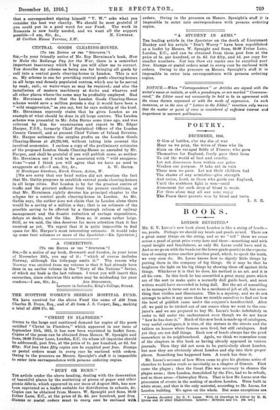CENTRAL GOODS CLEARING-HOUSES.
[To THE EDITOR or THE " SPECTATOR.") SHI,—In your friendly notice of Mr. Roy Horniman's book. How to Make the Railways Pay for the War, there is a somewhat important Inaccuracy which I beg you will allow me to correct. You describe my scheme as being one for bringing all goods by rail into a central goods clearing-house in London. This is not so. My scheme is one for providing central goods clearing-houses in all large and densely populated centres, which are to be served by road-, rail-, or water-ways as may be required; and also the installation of modern machinery at docks and wharves and all other places where the same may be profitably employed. Had Mr. Horniman stated that the London Goods Clearing-House scheme would save a million pounds a day it would have been a " wild exaggeration," as you say, but he says nothing of the kind. Mr. Horniman expressly states that he gives London as an example of what should be done in all large centres. The London scheme was presented to Mr. John Burns some time ago, and was referred by him for examination and report to Mr. Edgar Harper, F.S.S., formerly Chief Statistical Officer of the London County Council, and at present Chief Valuer of Inland Revenue. Mr. Harper estimates the surplus profits on the London Goods Clearing-House at £9,295,948, without taking into account the involved economies. I enclose a copy of the preliminary estimates of the proposed London Goods Clearing-House as amended by Mr. Harper, and shall be grateful if you will publish same, as neither Mr. Horniman nor I wish to be associated with " wild exaggera- tions "—and I think you will agree that we have no need to
exaggerate at all.—I am, Sir, &c., A. W. aims. 11 Montague Gardens, Birch Grove, Acton, W.
[We are sorry that our brief notice did not mention the fact that Mr. Gattie proposes to establish central goods clearing-houses in all large cities. But London is by far the greatest centre of traffic and the greatest sufferer from the present conditions, so that Mr. Horniman rightly devotes his principal chapter to the scheme for a central goods clearing-house in London. As Mr. Gallia says, the author does not claim that in London alone there would be a saving of a million a day; that is an estimate of the possible saving to be effected by a thorough reform of railway management and the drastic reduction of cartage expenditure, delays at docks, and the like. Even so, it seems rather large. Still, as we said, the idea deserves far more attention than it has received as yet. We regret that it is quite impossible to find space for Mr. Harper's most interesting estimate. It would take up some four columns or more of the Spectator.—ED. Spectator.]


































 Previous page
Previous page